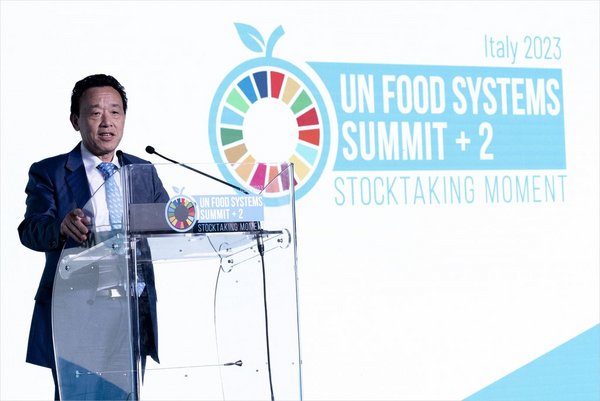 Read this article in French
Read this article in French- Share this article
- Subscribe to our newsletter
Stocktaking Moment
The UN Food Systems Summit+2 Stocktaking Moment (UNFSS+2) aimed to assess progress achieved towards the 2030 Agenda since the first UN Food Systems Summit in 2021. It took place at the Food and Agriculture Organization of the United Nations (FAO) headquarters in Rome, Italy from the 24th–26th July 2023. The three-day high-level event was convened by the United Nations Secretariat and hosted by Italy, in collaboration with FAO and two other Rome-based UN Agencies, the International Fund for Agricultural Development (IFAD) and the World Food Programme (WFP).
The event hosted 2,000 in-person participants and thousands of virtual attendees from 170 countries – including 22 heads of state, 103 ministerial-level delegates, close to 100 Food Systems National Convenors, 450 non-state actor (NSA) delegates and high-level delegates from the UN system and other international organisations.
According to The State of Food Security and Nutrition in the World 2023 released in July, 122 million more people have been suffering chronic malnourishment since 2019. Currently, over three billion people in the world cannot afford a healthy diet. Food systems are responsible for one-third of greenhouse gas emissions, up to 80 per cent of biodiversity loss and up to 70 per cent of fresh-water consumption.
Measuring progress – much remains to be done
The Secretary-General’s report “Making food systems work for people and planet – UN Food Systems Summit+2”, published on the 24th July, shows which areas progress has been made in. Despite some success, the report shows that more remains to be done.
A hundred and one countries submitted voluntary country progress reports, the results of which this report summarises. The country reports provided insights into the progress and efforts being made to transform food systems worldwide. There are 30 country reports from countries in Africa, 13 from the Americas, 28 from Asia, 16 from Europe and 14 from Oceania. 24 reports come from countries classified as high-income, 23 are classified as upper middle-income, 35 are classified as lower-middle-income, and 19 are classified as low-income. Some countries submitted a country report, even though they had not taken specific steps to adopt a national pathway or appoint a food systems national convenor.
Some 67 per cent of the countries reporting, particularly middle and high-income nations, successfully integrated the priorities outlined in their national pathways into their overarching national development plans and strategies.
- Approximately one quarter of the countries that submitted reports indicate a greater incorporation of critical topics into their legal frameworks. These include for example: the right to food (Nepal), food security and nutrition (Iraq), food loss and waste (Republic of Moldova), school meals (Latvia), healthy diets (Mexico), public procurement of food (Peru) and labour codes.
- Likewise, approximately a quarter of countries described initiatives aimed at positioning food systems transformation within the national social and political discourse, with the goal of building support, generating momentum for concerted action and fostering behaviour change.
- 70 per cent of countries indicated their efforts to establish or strengthen food systems governance, particularly among low- and low-middle-income countries.
- 38 per cent of countries took steps towards decentralisation and sub-national engagement in advancing their food systems transformation agendas.
- Half of the countries report progress in assessing financing gaps for food systems transformation, with only a few embarking on costing their national pathways.
- 59 per cent of countries actively sought to enhance their engagement with the scientific community.
- More than 63 per cent of countries report efforts to enhance data availability and utilisation for monitoring progress and evaluating impact.
- One third of countries reporting mentioned specific initiatives to create jobs.
Food systems transformation is key to reducing CO2 emissions
Guided by the report’s findings and national experiences, leaders and participants aim to reverse food insecurity and hunger in line with the 2030 Agenda by fully integrating national pathways into development strategies, securing finance to accelerate food systems transformation and responding to food crises through enhanced international cooperation and solidarity that leaves no one behind.
The event highlights that food systems transformation is key to reducing CO2 emissions and achieving the goal of the Paris Agreement, and that it requires cooperation with large food and agricultural companies. At the same time, cognisant of the worsening impacts of the climate crisis on agriculture and small farmers, leaders and key actors discussed adaptation measures and investments.
“This Stocktaking Moment has confirmed what we learned at the first Food Systems Summit in 2021 — that we can increase ambition and accelerate action. [...] Let us take the spirit of this convening into the broader push to rescue the SDGs and into the concrete, day-to-day efforts to make food systems work for everyone,” United Nations Deputy Secretary-General Amina Mohammed said at the closing ceremony of the UNFSS+2 Stocktaking Moment.
“The path is long and we need to accelerate our step,’’ FAO Director-General Qu Dongyu said, adding that he hoped that participants were leaving Rome with key takeaways to support their national pathways, after collectively recognising that the drivers of food insecurity and malnutrition had become even more complex due to the reinforcing and interconnected risk and impact of the climate crisis, economic shocks and ongoing conflicts.
Ines Lechner, editor, Rural 21
More information:





Add a comment
Be the First to Comment